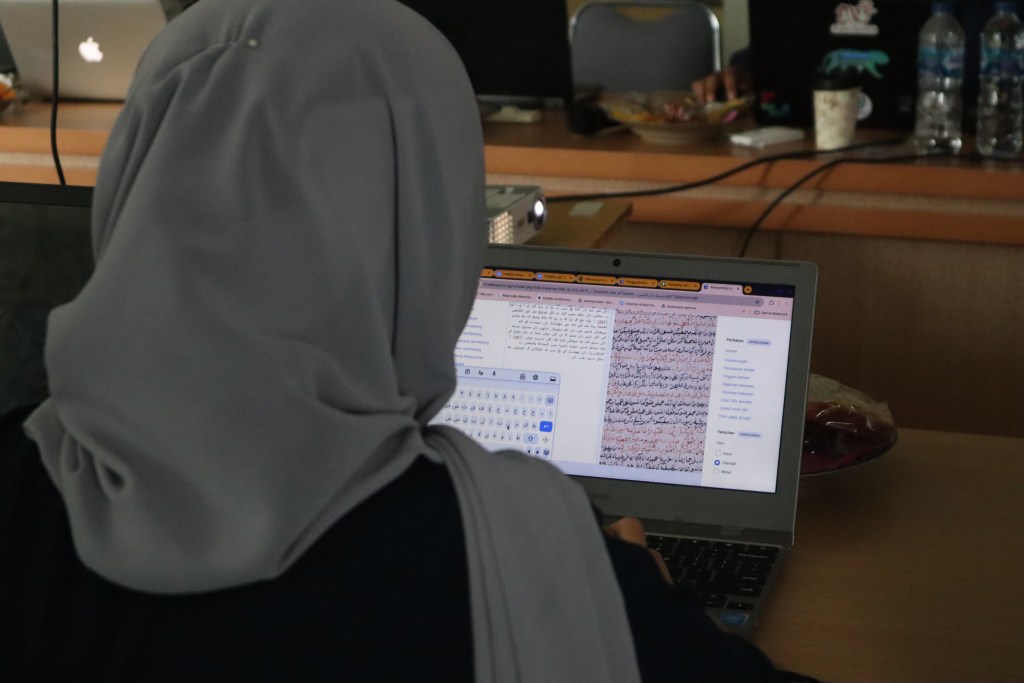
As part of the Wikisource Loves Manuscripts (WILMA) program, PPIM UIN Jakarta recently hosted a manuscript reading workshop at Minangkabau Corner, Andalas University, in Padang, West Sumatra, on Thursday, September 19, 2024. This initiative, led by PPIM UIN Jakarta in collaboration with Wikimedia Indonesia and the Wikimedia Foundation, aims to preserve and share the valuable knowledge contained in Malay-language manuscripts, particularly those from the Minangkabau region. The workshop follows two earlier sessions held in Jakarta and Yogyakarta, building on the ongoing efforts to safeguard this cultural heritage.
The workshop brought together 20 participants, including students from several universities in West Sumatra such as Andalas University and UIN Imam Bonjol, as well as cultural activists from organizations such as SURI (Surau Intellectual for Conservation), Wiki Padang Community, and SULUAH (Suaka Luhung Naskah) Padang. Led by experts Ilham Nurwansah and Abdullah Maulani, the participants were guided through the intricacies of transcribing ancient manuscripts. During the event, 23 pages of a manuscript in Arabic-Malay script, titled Terjemah al-Durr al-thāmin (Manuscript Code WM ID 010 0075), from the collection of Sheikh Abdul Latif Syakur in Agam Regency, West Sumatra, were successfully transcribed.
Sakti Pramudya, Senior Partnership Manager for ESEAP, Wikimedia Foundation, emphasized the importance of preserving and sharing this knowledge with the wider public through digital platforms. In his opening remarks, he encouraged participants to actively contribute to Wikisource, a Wikimedia platform dedicated to freely available, transcribed texts.
One of Wikimedia’s core missions is to liberate knowledge and make it accessible to everyone. Through this program, I hope participants will be part of the effort to share the knowledge contained in these Minangkabau manuscripts with the global community (Sakti Pramudya – Wikimedia Foundation)
Abdullah Maulani, WILMA Community Coordinator-PPIM UIN Jakarta, echoed this sentiment, expressing deep gratitude to the local community that made this initiative possible.
We extend our thanks to the SURI team for their hard work since 2023, when they became a crucial partner in WILMA’s efforts to digitize Sheikh Abdul Latif Syakur’s valuable manuscript collection. Without a strong and supportive local community, programs like this, which provide access to these cultural treasures, would be impossible. Today’s workshop is a continuation of our efforts to utilize the results of manuscript digitization for various purposes, particularly academic research (Abdullah Maulani – PPIM & UIN Jakarta)
In his presentation, Ilham Nurwansah, Wikimedian in Residence for WILMA, highlighted the crucial role young people play in preserving and promoting Nusantara manuscripts, especially in the digital age.
Young people, particularly students, have a key role in creating an ecosystem for the preservation of Malay manuscripts in West Sumatra. However, it is not enough to have the skill to read manuscripts; it must be accompanied by proficiency in using digital platforms to ensure these works are accessible to all (Ilham Nurwansah – WILMA Wikimedian in Residence)
The manuscript al-Durr al-thāmin fī ‘Aqāid al-Mu’minīn, which was transcribed during the workshop, is the work of Sheikh Daud al-Faṭānī (1720–1879), a distinguished scholar from Patani (in present-day Southern Thailand). This manuscript primarily focuses on Islamic theology, specifically following the Ash’ariyah school of thought. According to the colophon of the manuscript, it was completed and translated into Malay on Saturday, 17 Shawwal 1232 AH (August 19, 1817 CE) in Mecca by a scholar named Sheikh Ali from Trengganu. The fact that this manuscript is part of Sheikh Abdul Latif Syakur’s collection demonstrates the vast intellectual network of Minangkabau ulama, connecting scholars from the Ḥaramayn (Mecca and Medina), Patani, and Trengganu.
This event serves as a reminder of the rich intellectual heritage of the Minangkabau people and the importance of preserving and making these works available to future generations. Through efforts like WILMA, the knowledge contained within these manuscripts can transcend geographic boundaries, allowing the global community to appreciate the historical and cultural significance of Minangkabau scholarly traditions.
For further information about the WILMA program feel free to visit our page here

Can you help us translate this article?
In order for this article to reach as many people as possible we would like your help. Can you translate this article to get the message out?
Start translation